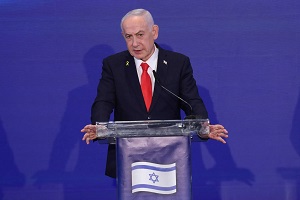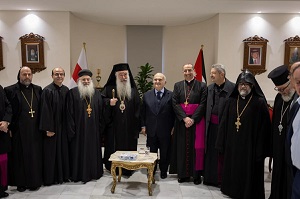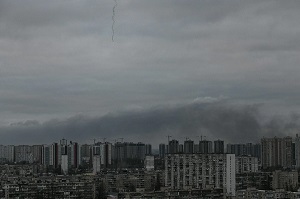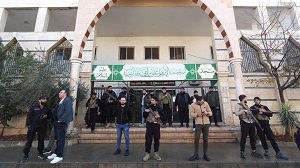Kashmir, Kirkuk And Jerusalem - By Ghassan Charbel, Alarabiya
It’s hard to be born on the line of contact. Fear will remain your companion. The line of contact between nationalities, religions, sects, and states. I know some are quick to say that pluralism is a source of wealth. But the reality is that pluralism remains a project of clash, unless the culture of tolerance takes root. Accepting to live under one roof with someone who doesn't resemble you, and drinks from springs other than the ones you drink from.
A child born on the contact line often inherits his parents' songs and his ancestors’ fears, which most oftenly nurture anxiety over heritage, tradition and the right to live freely. I am thinking here, for example, of a Muslim child born in the Indian part of Kashmir, inheriting from his parents the dream of joining his hometown in Pakistan.
Mistakes made in the creation of maps are never easy to correct. It is not enough to say that the population should be allowed to exercise the right to self-determination through a fair referendum. The story is more complex and dangerous. Disagreements at the contact line often imply a national wound. The entire country is captured by a small part, the sovereignty of which is disputed with a neighboring country or another nation-state.
The fate of this part becomes a constant and stormy test, and any failure with it parallels with disaster. In dealing with these national wounds, every moderation becomes a betrayal, especially when the street resonates, warning both the moderates and the extreme.
Since its birth in 1947, Kashmir has turned into a severe wound in the heart of Indo-Pakistani relations, triggering two wars between the two countries, whose streets are rife with the poor. None of the successive military and civilian leaders in Pakistan could defuse this explosive device. The same can be said of all those who took over the decision-making in India.
The United Nations failed to resolve the Kashmir problem, so did other mediators and advisers. It is no exaggeration to say that the scenario of confrontation over Kashmir is a constant item for the generals of the two armies. The possession of nuclear weapons by the two countries did not extinguish tensions in Kashmir, but it was enough to program the confrontations in such a way as to prevent them from becoming an all-out war that would portend a nuclear feast.
The new chapter of tension began when the government of Narendra Modi abolished the special status of the state of Jammu Kashmir which was guaranteed by the Indian Constitution. The parliament, controlled by the Hindu nationalist party, approved the move, including a decision to divide the Indian side of Kashmir into two areas directly under the authority of New Delhi. This was accompanied by sending Indian military reinforcements to the area, cutting off contacts to prevent protesters from gathering and organizing large-scale and violent protests.
The problem quickly turned into an acute crisis threatening to inflame the contact line. Pakistani Prime Minister Imran Khan has warned of widespread conflict, while Pakistani generals started updating previously prepared military plans. This was accompanied by the expulsion of the Indian ambassador from Pakistan, the severing of diplomatic ties and the decrease of trade.
Perhaps the most dangerous comments by Pakistan were that Indian measures, especially the division of the state, were aimed at making the Muslims a minority and opening the door to a change in identity and demographic equation.
The Kashmir contact line reminded me of the latent or burning lines of our region. In September 2017, days before the referendum called for by then-President of Kurdistan Massoud Barzani, I visited the region and made sure to tour Kirkuk, which chose to be included in the referendum project.
I traveled around this area, which is burdened by two riches turned two curses, namely, multiple affiliations and oil. On the streets of the city, Kurdish shops are adjacent to those of Arabs and Turkmen. The various clans there have found a mechanism to control disputes and prevent them from turning into large-scale conflicts.
Despite the attempt of those whom I met to lessen their anxiety over the future, it was clear that fear is the only common feeling among this mixture that was sentenced to live in one place. The Kurds were afraid that the turnout of the referendum would be low due to Kurdish-Kurdish differences and a long history of maneuvers and stabbing. Arabs dreaded the future of living in this area if Kirkuk chose to renew its Kurdish dream and join the region. It was no secret that some Turkmen were betting that neighboring countries, notably Turkey, would never allow the province to annex Kirkuk, nor would it allow the birth of an independent or semi-autonomous Kurdish entity.
What happened weeks later is that the countries were the Kurds are scattered, chose to abort the results of the Kurdish referendum and punished the Kurdistan region.
Pakistan’s comments about a demographic coup in Kashmir have happened repeatedly in Kirkuk. The people of the city talk about campaigns of Turkification, Arabization and Kurdification across different eras. Campaigns have led to changes in population equations that have deepened the wounds at the contact lines.
The crises of the contact line are long-standing crises. Neither the officials nor the parties dare to make concessions about them. The masses demand unequivocal positions, a complete victory, which is impossible or expensive. Governments in Iraq have changed, the name of the strongman has changed, and Kirkuk remained a fire that can be stifled, but not extinguished.
Issues which become more complicated and inflamed over time. Jerusalem also resides on the lines of contact. Attempts to make compromises are similar to igniting fire near gunpowder barrels. Efforts to encircle the dispute are in full swing.
But oppression is not a permanent solution. Suppressed identities hide, harden and then emerge. From Kashmir to Jerusalem to Kirkuk, a world mired in fears along the contact lines. In these identity battles, officials prefer to pay for disputes rather than settlements.
Latest News
-
 Netanyahu to Meet Trump in US on Monday for Talks on Iran, Gaza, Hezbollah, Syria
Netanyahu to Meet Trump in US on Monday for Talks on Iran, Gaza, Hezbollah, Syria
-
 JMD forecasts heavy rain, brisk winds, low visibility
JMD forecasts heavy rain, brisk winds, low visibility
-
 Prince Hassan congratulates Christians on Christmas
Prince Hassan congratulates Christians on Christmas
-
 Zelensky says Kyiv attack shows Russia does 'not want to end the war'
Zelensky says Kyiv attack shows Russia does 'not want to end the war'
-
 Same group behind Damascus church attack bombs Homs mosque
Same group behind Damascus church attack bombs Homs mosque